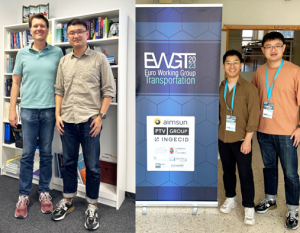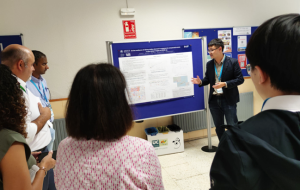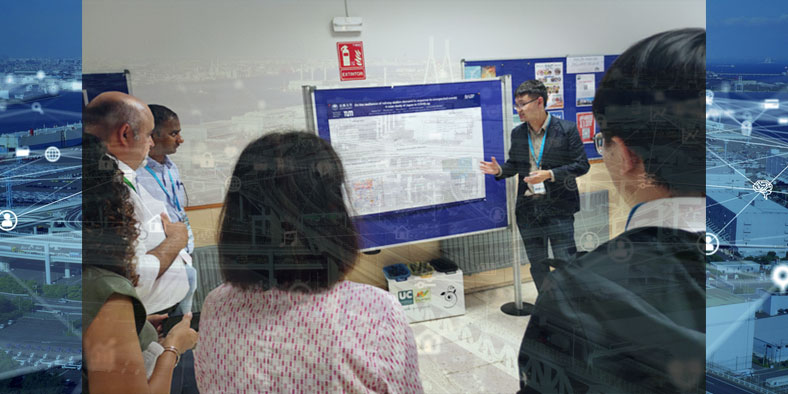Information of the Applicant from Kyoto University:
- Prof. Dr. Jan-Dirk Schmöcker, The Department of Urban Management, Graduate School of Engineering
Duration of Stay:
- August 31 to October 6, 2023
Aims:
- Collaborate on traffic resilience research at Technical University of Munich and present my findings at the EWGT conference, while gaining insights into Germany’s transportation policies
Visited Researchers and Institutions in Germany:
- Prof. Dr. Constantinos Antoniou, Chair of Transportation Systems Engineering, Technical University of Munich, School of Engineering and Design
Participated events; conferences, seminars, etc.:
- EWGT Conference 2023 (September 5-8, 2023, University of Cantabria)
Motivation for Kyoto-DAAD Programme
New Insights for the development of more resilient transportation networks
My current research focuses on analyzing and improving the resilience of urban transportation systems, particularly in the context of disruptions such as natural disasters and high demand periods. Germany, especially through the Technical University of Munich (TUM), has been at the forefront of innovative transportation research. The Kyoto-DAAD programme provided an ideal opportunity to collaborate with leading experts in this field, such as Professor Constantinos Antoniou and his PhD candidate Qinglong Lu. I applied for this programme to enhance my research through international collaboration, gain new insights into advanced methodologies, and contribute to the development of more resilient transportation networks.
Achievements and Outcomes of ECRs’ Stay
Collaboration and Development of Traffic Resilience Indicators
During my visit to the Technical University of Munich (TUM) as part of the Kyoto-DAAD exchange student program, I continued my collaboration with the Professor Constantinos Antoniou and the “transportation systems engineering lab”. The warm reception from all lab members made my stay productive and enjoyable. We worked on our co-authored paper, “Traffic Resilience Quantification Based on Macroscopic Fundamental Diagrams,” exploring innovative indicators to assess traffic resilience. Our research proposed new metrics to evaluate the resilience of transportation networks and validated their usefulness through case studies in Munich and Kyoto. We gained insights into the impact of different network structures, such as Munich’s ring-like network and Kyoto’s grid-like network, on traffic resilience.
Presentation at the EWGT Conference in Spain
During my stay, I also attended the EWGT conference in Spain and presented at a poster session. The poster focused on the resilience of railway station demand in Japan during COVID-19, analyzing demand drop and recovery patterns and proposing prediction models. This conference provided valuable feedback and networking opportunities.
9-Euro Ticket Study and Experience with the 49-Euro Ticket
At the same conference, my exchange partner Qinglong Lu presented his study on the 9-euro ticket policy, analyzing its impact on crowding patterns at stations. This study offered important insights into how Germany addressed the demand loss caused by COVID-19. Utilizing the 49-euro ticket, I explored Munich and other cities in Germany, gaining valuable insights into advanced transportation research and fostering academic and cultural exchanges.
Outlook for the Project
Building on the research network established during my stay in Munich, I aim to expand these connections across Europe and further contribute to the advancement of traffic resilience studies. This experience has opened new possibilities for future collaborations and provided me with a broader perspective on transportation systems research. I am optimistic the visit has contributed to the continued collaboration with TUM and the potential to apply our findings to enhance urban transportation resilience both in Japan and internationally.
Activities of German ECR in Kyoto University
Lu Qinglong, Research Associate, Transportation Systems Engineering, Technical University of Munich, School of Engineering and Design
Duration of Stay:
- May 2 to July 1, 2023
Aims:
- An MFD dynamics based resilience optimization model for road transportation under network disruptions
Visited Researchers and Institutions in Japan:
- Prof. Dr. Jan-Dirk Schmöcker, The Department of Urban Management, Graduate School of Engineering, Kyoto University


![[間:AI DA]: supporting international carrier development of early career researchers (ECRs)](/exchange/aida/wp-content/themes/kyoto-u-daad/img/logo-aida.png)



